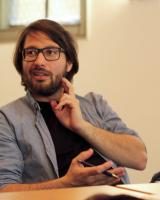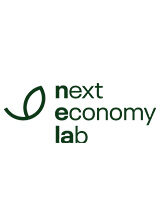Socioeconomic Education and Research
- Pluralistic
- Inter- and transdisciplinary
- Problem-driven
- Controversial
- Reflexive
- Networked
 Prof. Dr. Andreas Oehler
The widely spread information paradigm or information model creates the illusion that everyone could know and does everything at every time. However, many theoretical and empirical results suggest that not all of the important information within every life and consume area can be noticed, processed, retrieved, saved and considered in ... more
Prof. Dr. Andreas Oehler
The widely spread information paradigm or information model creates the illusion that everyone could know and does everything at every time. However, many theoretical and empirical results suggest that not all of the important information within every life and consume area can be noticed, processed, retrieved, saved and considered in ... more
 Dr. Christian Fischer
In order to support teenagers in their search for their own political position, it is important that they learn about and analyze different economic orders in school. Real processes of exploration and (self-)location are tied to pluralistic education offers. That is exactly what socioeconomic education and science stand for. Its ... more
Dr. Christian Fischer
In order to support teenagers in their search for their own political position, it is important that they learn about and analyze different economic orders in school. Real processes of exploration and (self-)location are tied to pluralistic education offers. That is exactly what socioeconomic education and science stand for. Its ... more
 Dr. Anna-Franziska Kähler
For me, socio-economic education is more than just imparting knowledge about economics and/or finance: it is an ‘instrument’ for justice and sustainability that enables people to critically question and actively shape their living environment. As an “educational climber”, strongly influenced by the experiences of fellow GDR citizens, I have learned ... more
Dr. Anna-Franziska Kähler
For me, socio-economic education is more than just imparting knowledge about economics and/or finance: it is an ‘instrument’ for justice and sustainability that enables people to critically question and actively shape their living environment. As an “educational climber”, strongly influenced by the experiences of fellow GDR citizens, I have learned ... more
 Marcus Erben
Every socioeconomic education has to start with the clarification that the German “economic wonder” was no wonder. Based on this (alienated) provocation, one can retrace what a education means that integrates the social into the economical and vice versa: the comprehended and understood appropriation of social, political, economic contexts, economic ... more
Marcus Erben
Every socioeconomic education has to start with the clarification that the German “economic wonder” was no wonder. Based on this (alienated) provocation, one can retrace what a education means that integrates the social into the economical and vice versa: the comprehended and understood appropriation of social, political, economic contexts, economic ... more
 Prof. Dr. Andrea Maurer
The modern social science wants to explore contexts and structures within society, economy, politics, culture and many more to eventually provide scientifically-proven, factual knowledge. Sociology, business economics, political economics and others are part of this social-scientific overall project and only together will contribute to a preferably good and realistic image ... more
Prof. Dr. Andrea Maurer
The modern social science wants to explore contexts and structures within society, economy, politics, culture and many more to eventually provide scientifically-proven, factual knowledge. Sociology, business economics, political economics and others are part of this social-scientific overall project and only together will contribute to a preferably good and realistic image ... more
 Prof. Dr. Dr. Helge Peukert
In light of the massive manipulation efforts by the private economy, financial economy and compliant scientific inside workers for a well-behaved market liberal perspective, a socioeconomic education that provides pluralistic viewpoints on our economic system has never been as important as it is today. The almost daily horrific news about ... more
Prof. Dr. Dr. Helge Peukert
In light of the massive manipulation efforts by the private economy, financial economy and compliant scientific inside workers for a well-behaved market liberal perspective, a socioeconomic education that provides pluralistic viewpoints on our economic system has never been as important as it is today. The almost daily horrific news about ... more
 Dr. Maria Hofmann-Schneller
Undoubted, we live in a society that is marked by a rapid political, social and economic change and is permanently questioned in its “certainties”. A skill-centered socioeconomic education should put students in the position to deal with complex, controversial and pluralistic opinions in their daily routine, in politics, in the ... more
Dr. Maria Hofmann-Schneller
Undoubted, we live in a society that is marked by a rapid political, social and economic change and is permanently questioned in its “certainties”. A skill-centered socioeconomic education should put students in the position to deal with complex, controversial and pluralistic opinions in their daily routine, in politics, in the ... more
 Greta Fexer
Socio-economics education aims to meet political, social and economic challenges. A socio-economic approach enables a multi-perspective view, while at the same time highlighting controversial aspects of integrative disciplines. To keep up with the constant changes in politics, society and the economy, a socio-economic education must continuously reflect the economic reality. more
Greta Fexer
Socio-economics education aims to meet political, social and economic challenges. A socio-economic approach enables a multi-perspective view, while at the same time highlighting controversial aspects of integrative disciplines. To keep up with the constant changes in politics, society and the economy, a socio-economic education must continuously reflect the economic reality. more
 Falko Schmidt
The decisive driving force for the equalisation of living conditions at the national and international level is education – codified in the spread of knowledge and qualifications (Piketty). These drivers are particularly constituted by the prevailing political and institutional frameworks. Without a multi-paradigmatic self-understanding, it is hard to imagine how ... more
Falko Schmidt
The decisive driving force for the equalisation of living conditions at the national and international level is education – codified in the spread of knowledge and qualifications (Piketty). These drivers are particularly constituted by the prevailing political and institutional frameworks. Without a multi-paradigmatic self-understanding, it is hard to imagine how ... more
 Prof. Dr. Birger P. Priddat
The economy is highly effective but not necessarily efficient. It misses many normative requirements to “re-rationalize” the visible deficits. It is an economy of guess, far apart from its own logistic understanding. The rich offers by other sciences remain unused as long as the economy misunderstands itself as a closed ... more
Prof. Dr. Birger P. Priddat
The economy is highly effective but not necessarily efficient. It misses many normative requirements to “re-rationalize” the visible deficits. It is an economy of guess, far apart from its own logistic understanding. The rich offers by other sciences remain unused as long as the economy misunderstands itself as a closed ... more
 Prof. Dr. Carsten Herrmann-Pillath
In the light of my own research, socio-economic “Bildung” has two dimensions: First, it is about the ability to critically reflect on economic analyses, theories and policies and to arrive at one’s own position; second, this requires conscious value attitudes that are emotionally rooted. The latter means adopting an attitude ... more
Prof. Dr. Carsten Herrmann-Pillath
In the light of my own research, socio-economic “Bildung” has two dimensions: First, it is about the ability to critically reflect on economic analyses, theories and policies and to arrive at one’s own position; second, this requires conscious value attitudes that are emotionally rooted. The latter means adopting an attitude ... more
 Dr. Sandra Milz (geb. Stieger)
The Austrian school subject “Geography and Economics” defines economic action as spatial-historical embossed, socially embedded and individually meaningful. Thus, it follows a socioeconomic understanding of education. Nevertheless, the subject, as in other countries, is confronted with the repeated demand that the domain “economy” should be separated from its spatial-socioscientific dimensions. ... more
Dr. Sandra Milz (geb. Stieger)
The Austrian school subject “Geography and Economics” defines economic action as spatial-historical embossed, socially embedded and individually meaningful. Thus, it follows a socioeconomic understanding of education. Nevertheless, the subject, as in other countries, is confronted with the repeated demand that the domain “economy” should be separated from its spatial-socioscientific dimensions. ... more
 Prof. Dr. Georg Tafner
We are living in an economic-orientated Europe. Meyer (2005) talks about the culture of rationality and Vietta (2012) about the empire of rationality. How should and can an economic upbringing and education look like in a society in which rationality, functionality and economic thinking are central, highly important and influential ... more
Prof. Dr. Georg Tafner
We are living in an economic-orientated Europe. Meyer (2005) talks about the culture of rationality and Vietta (2012) about the empire of rationality. How should and can an economic upbringing and education look like in a society in which rationality, functionality and economic thinking are central, highly important and influential ... more
 Prof. Dr. Stefanie Hiß
Socioeconomic education is the key to a complex and networked thinking. It prepares the foundation for a balanced discussion about the diverse social, political, ecological and economic challenges of the future. more
Prof. Dr. Stefanie Hiß
Socioeconomic education is the key to a complex and networked thinking. It prepares the foundation for a balanced discussion about the diverse social, political, ecological and economic challenges of the future. more
 Prof. Dr. Wolfram Elsner
Relevant economics is workable only as a comprehensive socio-economics, which reflects the complexity of reality. And as such, it has to be interdisciplinary and pluralistic. A pseudo-science of closed equilibrium models with physical analogies of the last century leads to nowhere, or, at worst, to the current catastrophic economic, social ... more
Prof. Dr. Wolfram Elsner
Relevant economics is workable only as a comprehensive socio-economics, which reflects the complexity of reality. And as such, it has to be interdisciplinary and pluralistic. A pseudo-science of closed equilibrium models with physical analogies of the last century leads to nowhere, or, at worst, to the current catastrophic economic, social ... more
 Marcel Beyer
It disturbs me that a rational logic does not only percolate more and more social areas, but also percolates the thinking and locations – educational institutions and subjects – where these should be trained. Socioeconomic education prevents a (paradigmatic) constriction of thinking and acting. With the help of diverse perspectives ... more
Marcel Beyer
It disturbs me that a rational logic does not only percolate more and more social areas, but also percolates the thinking and locations – educational institutions and subjects – where these should be trained. Socioeconomic education prevents a (paradigmatic) constriction of thinking and acting. With the help of diverse perspectives ... more
 Prof. Dr. Jakob Kapeller
Socioeconomic means the attempt to examine economic correlations against the background of their social embedment. Therefore, a socioeconomic perspective perfectly enables an interdisciplinary and problem-driven approach that the modern social science oftentimes misses. more
Prof. Dr. Jakob Kapeller
Socioeconomic means the attempt to examine economic correlations against the background of their social embedment. Therefore, a socioeconomic perspective perfectly enables an interdisciplinary and problem-driven approach that the modern social science oftentimes misses. more
 Prof. Dr. Leonhard Dobusch
Social events are a consistent phenomenon. From its great tide the ordering hand of the researcher forcibly lifts out the economic facts,’ reads the first sentence in Schumpeter’s “Theory of Economic Development“ published in 1912. For me, socioeconomics means to be open to diverse methods such as theories and to ... more
Prof. Dr. Leonhard Dobusch
Social events are a consistent phenomenon. From its great tide the ordering hand of the researcher forcibly lifts out the economic facts,’ reads the first sentence in Schumpeter’s “Theory of Economic Development“ published in 1912. For me, socioeconomics means to be open to diverse methods such as theories and to ... more
 Dr. Christiane Thole
The professional identity of the employees is the so called “Human Capital“ which is the basis for the quality of life and prosperity of all. Promoting their development must therefore be at the core of vocational and socio-economic educational processes. more
Dr. Christiane Thole
The professional identity of the employees is the so called “Human Capital“ which is the basis for the quality of life and prosperity of all. Promoting their development must therefore be at the core of vocational and socio-economic educational processes. more
 Prof. Dr. Udo Hagedorn
Socioeconomic education is a fundamental part and framework of a well-grounded argument about vocational education programs. The educational aspects as well as the one of socioeconomics are in their connections reflection points for a pedagogical, didactical and professional-didactical discussion to develop, analyze and implement curricula into wide social responsibility. The ... more
Prof. Dr. Udo Hagedorn
Socioeconomic education is a fundamental part and framework of a well-grounded argument about vocational education programs. The educational aspects as well as the one of socioeconomics are in their connections reflection points for a pedagogical, didactical and professional-didactical discussion to develop, analyze and implement curricula into wide social responsibility. The ... more
 Dr. Alexander Lenger
For the pervasion of the increasing complex economic and social processes, an informed and well-grounded socioscientific education is an indispensable condition. For this, a cultural or respectively contextual view that complements the one-dimensional and shortened orientation of the so-called mainstream economic science is needed. Because, to reach realistic and practical ... more
Dr. Alexander Lenger
For the pervasion of the increasing complex economic and social processes, an informed and well-grounded socioscientific education is an indispensable condition. For this, a cultural or respectively contextual view that complements the one-dimensional and shortened orientation of the so-called mainstream economic science is needed. Because, to reach realistic and practical ... more
 Dr. Dirk Ehnts
These days, socioeconomic education in economy is a highly demanded approach because the economic element cannot be separated from the social one. Financial crises are symptoms of social and economic problems. Therefore, their common appearances have to be analyzed socioeconomically. The fact that modern money mediated access to resources demands ... more
Dr. Dirk Ehnts
These days, socioeconomic education in economy is a highly demanded approach because the economic element cannot be separated from the social one. Financial crises are symptoms of social and economic problems. Therefore, their common appearances have to be analyzed socioeconomically. The fact that modern money mediated access to resources demands ... more
 Prof. Dr. Doris Neuberger
At the latest since the global financial and economic crisis, we have known that pure economic education leads to a dead end. Socioeconomic education helps to comprehend the economic system as a social and unbalanced system, to better understand its opportunities and risks for society as a whole, to critically ... more
Prof. Dr. Doris Neuberger
At the latest since the global financial and economic crisis, we have known that pure economic education leads to a dead end. Socioeconomic education helps to comprehend the economic system as a social and unbalanced system, to better understand its opportunities and risks for society as a whole, to critically ... more
 Prof. Dr. Thomas Vogel
Our whole culture nowadays is percolated by economic thinking. Overt, but too often subliminal and unconscious as well, this thinking drives human actions and, in doing so, practices a great, oftentimes anonymous power over humans. The economy’s gain of greater importance as well as the global economic crises increase the ... more
Prof. Dr. Thomas Vogel
Our whole culture nowadays is percolated by economic thinking. Overt, but too often subliminal and unconscious as well, this thinking drives human actions and, in doing so, practices a great, oftentimes anonymous power over humans. The economy’s gain of greater importance as well as the global economic crises increase the ... more
 Christian Fahrbach
The issue of low-profit is a financial-scientific reclaimed land and an interdisciplinary challenge for the socioeconomic education. On the one hand, this includes that businesses lay out innovative CSR-measures and simultaneously prefer welfare aims to financial aims. On the other hand, businesses need cheap capital to finance demanded investigations. Because ... more
Christian Fahrbach
The issue of low-profit is a financial-scientific reclaimed land and an interdisciplinary challenge for the socioeconomic education. On the one hand, this includes that businesses lay out innovative CSR-measures and simultaneously prefer welfare aims to financial aims. On the other hand, businesses need cheap capital to finance demanded investigations. Because ... more
 Prof. Dr. Martin Höpner
The matter of economic education must not be understood as the mediation of the misbelief that everyone is having a better life if everyone only thinks about themselves. It is rather about the understanding of our economic system within its political, social, historical and international contexts and to learn that ... more
Prof. Dr. Martin Höpner
The matter of economic education must not be understood as the mediation of the misbelief that everyone is having a better life if everyone only thinks about themselves. It is rather about the understanding of our economic system within its political, social, historical and international contexts and to learn that ... more
 Prof. Dr. Harald Hantke
To be individually relevant, economic education has to orientate itself at the lifeworlds of its learners. Such a constructed economic education is socioeconomic education. It offers learners the opportunity to critically reflect upon their roles in the tension between economic, ecological and socio-cultural thinking and acting. Socioeconomic education can thus ... more
Prof. Dr. Harald Hantke
To be individually relevant, economic education has to orientate itself at the lifeworlds of its learners. Such a constructed economic education is socioeconomic education. It offers learners the opportunity to critically reflect upon their roles in the tension between economic, ecological and socio-cultural thinking and acting. Socioeconomic education can thus ... more
 Prof. Dr. Anke Uhlenwinkel
The idea of “the economy” as a political relevant unit is a relatively new concept. With its neoclassical approaches, this idea is also very well suited to lever out democratic processes. Several young British economists call the result “Econocracy”, an incapacitated form of society’s organization that, according to their argument, ... more
Prof. Dr. Anke Uhlenwinkel
The idea of “the economy” as a political relevant unit is a relatively new concept. With its neoclassical approaches, this idea is also very well suited to lever out democratic processes. Several young British economists call the result “Econocracy”, an incapacitated form of society’s organization that, according to their argument, ... more
 Dr. Harald Strauß
Socio-economic education and science as a pluralistic and interdisciplinary approach to the phenomena that inevitably arise with the organised self-preservation of human beings is first of all a critique of the mainstream. However, this should not be the end of the matter, since in view of the foreseeable escalations, it ... more
Dr. Harald Strauß
Socio-economic education and science as a pluralistic and interdisciplinary approach to the phenomena that inevitably arise with the organised self-preservation of human beings is first of all a critique of the mainstream. However, this should not be the end of the matter, since in view of the foreseeable escalations, it ... more
 Volker Schwier
A socioscientific reflective subject of social studies offers already manifold connecting factors to support socioeconomic educational processes prematurely. But while primary students are not only expected to orientate themselves within a complex social world, but also have to expand their freedom of possible actions, various didactical proposals for the primary ... more
Volker Schwier
A socioscientific reflective subject of social studies offers already manifold connecting factors to support socioeconomic educational processes prematurely. But while primary students are not only expected to orientate themselves within a complex social world, but also have to expand their freedom of possible actions, various didactical proposals for the primary ... more
 Prof. Dr. Tim Engartner
Socioeconomic education has to accommodate the demands for a renewal of economy by presenting its self-concept as less a natural, but more as a multiparadigmatic social science to obligate itself to the principles of interdisciplinary and controversy and also the permanent ethic reflection. During times where more and more social ... more
Prof. Dr. Tim Engartner
Socioeconomic education has to accommodate the demands for a renewal of economy by presenting its self-concept as less a natural, but more as a multiparadigmatic social science to obligate itself to the principles of interdisciplinary and controversy and also the permanent ethic reflection. During times where more and more social ... more
 Lisa-Marie Schröder
Present and future key problems and related issues are characterized by enormous complexity and versatility. In order to be able to deal with these, a multi-perspective, pluralistic approach is required, which only networked socioeconomic education and research can offer. more
Lisa-Marie Schröder
Present and future key problems and related issues are characterized by enormous complexity and versatility. In order to be able to deal with these, a multi-perspective, pluralistic approach is required, which only networked socioeconomic education and research can offer. more
 NELA e. V.
Socioeconomic education enables citizens to understand economic and social contexts as well as to question them. To do so, a critical, well-grounded analysis of the present social-ecological challenges as well as discussion about the already available, possible and diverse solutions are necessary. Therefore, socioeconomic education lays the foundation to shape ... more
NELA e. V.
Socioeconomic education enables citizens to understand economic and social contexts as well as to question them. To do so, a critical, well-grounded analysis of the present social-ecological challenges as well as discussion about the already available, possible and diverse solutions are necessary. Therefore, socioeconomic education lays the foundation to shape ... more
 Prof. Dr. Walter Otto Ötsch
We live in an economic-dominated society; economic calculations and rules have become determining factors for many areas of life. The economic science has become society’s leading science. Among other things, this became possible because the economic science began to understand itself as “imperial”. Here, it cannot define any borders for ... more
Prof. Dr. Walter Otto Ötsch
We live in an economic-dominated society; economic calculations and rules have become determining factors for many areas of life. The economic science has become society’s leading science. Among other things, this became possible because the economic science began to understand itself as “imperial”. Here, it cannot define any borders for ... more
 Dr. Birgit Happel
Socio-economic education aims at the emancipatory core of educational processes. It enables critical reflection on social conditions and contexts. Inequality, climate and care crises are unresolved challenges of our time. In order to see societal problems in structural contexts and not to individualize them and dump them on the shoulders ... more
Dr. Birgit Happel
Socio-economic education aims at the emancipatory core of educational processes. It enables critical reflection on social conditions and contexts. Inequality, climate and care crises are unresolved challenges of our time. In order to see societal problems in structural contexts and not to individualize them and dump them on the shoulders ... more
 Marc Casper
Neither “economic science” nor “education” exists beyond the “social”. Does that mean that socioeconomic education is a tautology? Unfortunately not, when we look at how instrumentalist economic issues are treated at many schools and universities under the label “education”. As an economic educationalist I want to contribute through research and ... more
Marc Casper
Neither “economic science” nor “education” exists beyond the “social”. Does that mean that socioeconomic education is a tautology? Unfortunately not, when we look at how instrumentalist economic issues are treated at many schools and universities under the label “education”. As an economic educationalist I want to contribute through research and ... more
 Prof. Dr. Thomas Hermann
For me, economic education means the education of critical thinking, deep learning and critical questioning of seemingly matters of course. In doing so, future graduates of business and social economics will later learn to find answers to the present social questions together with others. A teaching, which uses narrative structures ... more
Prof. Dr. Thomas Hermann
For me, economic education means the education of critical thinking, deep learning and critical questioning of seemingly matters of course. In doing so, future graduates of business and social economics will later learn to find answers to the present social questions together with others. A teaching, which uses narrative structures ... more
 ✝ Prof. i. R. Dr. Gerd-E. Famulla
The teaching of the universal application of the cost-benefit-calculation onto all life situations strengthens learners’ self-economization and conveys the certainty that the economic worldview is the right one. The socioeconomic education on the other side acknowledges the diversity of motives of action and treats the “homo oeconomicus”, who aspires to ... more
✝ Prof. i. R. Dr. Gerd-E. Famulla
The teaching of the universal application of the cost-benefit-calculation onto all life situations strengthens learners’ self-economization and conveys the certainty that the economic worldview is the right one. The socioeconomic education on the other side acknowledges the diversity of motives of action and treats the “homo oeconomicus”, who aspires to ... more
 Jun.-Prof. Dr. Steve Kenner
I think that the initiatives that have been pushed for some years to establish financial education and, more specifically, economics as a school subject separate from civic education are problematic because they give the illusion that an exploration of economics would be thinkable without an analysis and critique of existing ... more
Jun.-Prof. Dr. Steve Kenner
I think that the initiatives that have been pushed for some years to establish financial education and, more specifically, economics as a school subject separate from civic education are problematic because they give the illusion that an exploration of economics would be thinkable without an analysis and critique of existing ... more
 Philipp Kenel
Mature citizens need a socioeconomic education and science! Today, our world is becoming more and more complex and even if the economy, politics and society have never been isolated domains, the interconnectedness between them become more and more obviously. Socioeconomic education and economy contribute to a better understanding of this ... more
Philipp Kenel
Mature citizens need a socioeconomic education and science! Today, our world is becoming more and more complex and even if the economy, politics and society have never been isolated domains, the interconnectedness between them become more and more obviously. Socioeconomic education and economy contribute to a better understanding of this ... more
 Prof. Dr. Christian Fridrich
The subject “Geography and Economics”, which is well institutionalized at Austrian schools on the secondary level, understands economy as socially embedded and shapeable. In the center of it stand the humans, in social, spatial and economic acting contexts. A central aim is to foster young learners’ responsibility as well as ... more
Prof. Dr. Christian Fridrich
The subject “Geography and Economics”, which is well institutionalized at Austrian schools on the secondary level, understands economy as socially embedded and shapeable. In the center of it stand the humans, in social, spatial and economic acting contexts. A central aim is to foster young learners’ responsibility as well as ... more
 Prof. Dr. Oliver Bierhoff
Socioeconomic education and science as an interdisciplinary project is a chance, apart from the basic economic “set of figures” and “blind spots” of the disciplinary and paradigmatic narrowed economic mainstreams, to fully grasp “the whole of economy”. Economy could be understood as a social event from which politics, culture, social ... more
Prof. Dr. Oliver Bierhoff
Socioeconomic education and science as an interdisciplinary project is a chance, apart from the basic economic “set of figures” and “blind spots” of the disciplinary and paradigmatic narrowed economic mainstreams, to fully grasp “the whole of economy”. Economy could be understood as a social event from which politics, culture, social ... more
 Dr. Stefan Müller
Socioeconomic education itself contributes to an interdisciplinary thinking about the society’s establishment. Requirements for this are pluralistic approaches that can be questioned themselves. Thus, within competing models, theories and concepts, their implicit assumptions, normative reference points, central thinking and argumentation figures as well as their social consequences and effects will ... more
Dr. Stefan Müller
Socioeconomic education itself contributes to an interdisciplinary thinking about the society’s establishment. Requirements for this are pluralistic approaches that can be questioned themselves. Thus, within competing models, theories and concepts, their implicit assumptions, normative reference points, central thinking and argumentation figures as well as their social consequences and effects will ... more
 Prof. Dr. Till van Treeck
Socioeconomic education motivates teachers and students to recognize scientific and social controversies about economic contexts as central parts of the economic science. All too often, present influential economic standard literature, which are embossed by dominant economic thinking from the time before the major financial crises at the beginning of the ... more
Prof. Dr. Till van Treeck
Socioeconomic education motivates teachers and students to recognize scientific and social controversies about economic contexts as central parts of the economic science. All too often, present influential economic standard literature, which are embossed by dominant economic thinking from the time before the major financial crises at the beginning of the ... more
 Prof. Dr. Nikolina Fuduric
A reductionist worldview in research, education and in practice has the tendency to leave out very important externalities to humankind’s detriment. It also supports the notion of narrow expertise and hierarchies when what the world really needs is humility and cooperation. The idea of observing, working and reflecting in larger ... more
Prof. Dr. Nikolina Fuduric
A reductionist worldview in research, education and in practice has the tendency to leave out very important externalities to humankind’s detriment. It also supports the notion of narrow expertise and hierarchies when what the world really needs is humility and cooperation. The idea of observing, working and reflecting in larger ... more
 Prof. Dr. Matthias Thiemann
Socioeconomic education has to be more than just a “tool-kit” which enables students to properly orientate themselves in a financialized world. It rather has to encourage the critical reflection of social changes and financialization and point out alternative ways of being. Society needs criticism to be governed and shaped not ... more
Prof. Dr. Matthias Thiemann
Socioeconomic education has to be more than just a “tool-kit” which enables students to properly orientate themselves in a financialized world. It rather has to encourage the critical reflection of social changes and financialization and point out alternative ways of being. Society needs criticism to be governed and shaped not ... more
 Prof. Dr. Annette Hoxtell
Economic action always takes place within a social context – it influences it and it is influenced by it. One-dimensional explanations do not satisfy this complexity. In the worst case, they cause a “simplistic” standardized opinion that is transferred to other domains to encourage unethical and self-exploiting action. Socioeconomic education ... more
Prof. Dr. Annette Hoxtell
Economic action always takes place within a social context – it influences it and it is influenced by it. One-dimensional explanations do not satisfy this complexity. In the worst case, they cause a “simplistic” standardized opinion that is transferred to other domains to encourage unethical and self-exploiting action. Socioeconomic education ... more
 Prof. Dr. Johannes Hirata
It does not matter whether it is climate change, the fear of globalization or a housing shortage; economic interpretations of present challenges fall short due to their methodological one-sidedness and oftentimes can only offer orientation to questionable efficiency terms during the search of good economic development. Because of that, a ... more
Prof. Dr. Johannes Hirata
It does not matter whether it is climate change, the fear of globalization or a housing shortage; economic interpretations of present challenges fall short due to their methodological one-sidedness and oftentimes can only offer orientation to questionable efficiency terms during the search of good economic development. Because of that, a ... more
 Dr. Matthias Schmelzer
In order to understand and deal with the current social, political and ecological crises, society needs critical, transformative, socio-economic science and education. Only in this way can we understand capitalism, question the increasing economization of society and nature, and develop the capacity for utopia – and not only in the ... more
Dr. Matthias Schmelzer
In order to understand and deal with the current social, political and ecological crises, society needs critical, transformative, socio-economic science and education. Only in this way can we understand capitalism, question the increasing economization of society and nature, and develop the capacity for utopia – and not only in the ... more
 Prof. Dr. Frank Beckenbach
In contrast to most (proclaimed) “postmodern” loosening in other social areas, the political economy at universities is on its way to becoming a basic-science solidification and closure in favor of a “modern” neo-classical standard. The research-driven forces in this development also mirror themselves – according to a layout by the ... more
Prof. Dr. Frank Beckenbach
In contrast to most (proclaimed) “postmodern” loosening in other social areas, the political economy at universities is on its way to becoming a basic-science solidification and closure in favor of a “modern” neo-classical standard. The research-driven forces in this development also mirror themselves – according to a layout by the ... more
 Dr. Peter W. Heller
Socioeconomic education, its consolidation and distribution that the ASEER demands, is also an issue for endowments. This is because swimming against the hegemonic tide of neoclassical research and education at German universities requires solid support by the civil society to function as a counterbalance compared to the impact of federal ... more
Dr. Peter W. Heller
Socioeconomic education, its consolidation and distribution that the ASEER demands, is also an issue for endowments. This is because swimming against the hegemonic tide of neoclassical research and education at German universities requires solid support by the civil society to function as a counterbalance compared to the impact of federal ... more
 Janina Urban
Economy is a fascinating subject and thus, should not be avoided by students with questions about this world. But not only this: All questions of a globalized, highly unequal and, itself, political closing world can, from my perspective, only be understood in a (futuristic) socioeconomic research and educational program. more
Janina Urban
Economy is a fascinating subject and thus, should not be avoided by students with questions about this world. But not only this: All questions of a globalized, highly unequal and, itself, political closing world can, from my perspective, only be understood in a (futuristic) socioeconomic research and educational program. more
 Magdalena Prieler
Getting to know the economy within a socioeconomic understanding embedded into society and nature is essential for students of economic sciences. Only then, they can develop a good understanding for the challenges of our time as well as inequalities or ecological and climate crises. more
Magdalena Prieler
Getting to know the economy within a socioeconomic understanding embedded into society and nature is essential for students of economic sciences. Only then, they can develop a good understanding for the challenges of our time as well as inequalities or ecological and climate crises. more
 Prof. Dr. Bettina Zurstrassen
We need a socioeconomic education because in a democracy, learners have the right to interpret economic embossed social problems and life situations from the perspective of various theoretical approaches and experiences from sociology, political science and economics. The handling of complex social challenges and life situations demands the skill to ... more
Prof. Dr. Bettina Zurstrassen
We need a socioeconomic education because in a democracy, learners have the right to interpret economic embossed social problems and life situations from the perspective of various theoretical approaches and experiences from sociology, political science and economics. The handling of complex social challenges and life situations demands the skill to ... more
 Anna Saave
Which economic education helps to understand and shape the late capitalist Anthropocene? How must socio-economic education be designed to enable people not only to deal with value in a quantitative way, but also to make socially balanced and sustainable decisions? Which insights does economic education have to teach in order ... more
Anna Saave
Which economic education helps to understand and shape the late capitalist Anthropocene? How must socio-economic education be designed to enable people not only to deal with value in a quantitative way, but also to make socially balanced and sustainable decisions? Which insights does economic education have to teach in order ... more
 Dr. Moritz Peter Haarmann
Socioeconomic perspectives make economy in its feature as social challenge understandable and encourage us to argue with structures of economic power. Because of this, it is a democratic command that economy at schools and universities be implemented within its social interdependence. more
Dr. Moritz Peter Haarmann
Socioeconomic perspectives make economy in its feature as social challenge understandable and encourage us to argue with structures of economic power. Because of this, it is a democratic command that economy at schools and universities be implemented within its social interdependence. more
 Dr. Subin Nijhawan
Socioeconomic education and science enable a humanistic access for everyone to present “big questions” in respect to a sustainable future for our world. more
Dr. Subin Nijhawan
Socioeconomic education and science enable a humanistic access for everyone to present “big questions” in respect to a sustainable future for our world. more
 Prof. Dr. Christoph Schank
Every economic act is inevitably normative and should not be separated from ethical questions. In fact, a conscious cogitation about the cultural life design is needed, as we, as a society, try to realize a human-serving economy. In this sense, a well-understood economic rationality has to critically question the emerging ... more
Prof. Dr. Christoph Schank
Every economic act is inevitably normative and should not be separated from ethical questions. In fact, a conscious cogitation about the cultural life design is needed, as we, as a society, try to realize a human-serving economy. In this sense, a well-understood economic rationality has to critically question the emerging ... more
 Prof. i. R. Dr. Sibylle Reinhardt
General education neither prepares for specific jobs nor for the study of specific subjects at university bur rather supports young learners with their handling of various situations: private or social or political. Modern society is also an economic society which means that many life areas are influenced by economic principles. ... more
Prof. i. R. Dr. Sibylle Reinhardt
General education neither prepares for specific jobs nor for the study of specific subjects at university bur rather supports young learners with their handling of various situations: private or social or political. Modern society is also an economic society which means that many life areas are influenced by economic principles. ... more
 Prof. Dr. Hans-Jürgen Bieling
Theories and perspectives of analysis are always connected to specific cognitive interests. Political-economic and socioeconomic approaches will focus on questions that address the power relationships, interests, discourses and also the reasons of economic and social development and crisis processes. more
Prof. Dr. Hans-Jürgen Bieling
Theories and perspectives of analysis are always connected to specific cognitive interests. Political-economic and socioeconomic approaches will focus on questions that address the power relationships, interests, discourses and also the reasons of economic and social development and crisis processes. more
 Prof. i. R. Dr. Gertraude Mikl-Horke
Socioeconomic education is necessary to reconnect economic action with social action and society. This presupposes that the economy enters a dialogue with the sociosciences and that sociology, as well, engages itself in economy and economic theories. Here, socioeconomic has to give itself a problem-oriented outline so that it can develop ... more
Prof. i. R. Dr. Gertraude Mikl-Horke
Socioeconomic education is necessary to reconnect economic action with social action and society. This presupposes that the economy enters a dialogue with the sociosciences and that sociology, as well, engages itself in economy and economic theories. Here, socioeconomic has to give itself a problem-oriented outline so that it can develop ... more
 Prof. Dr. Ulf Schrader
We need a socioeconomic education because traditional economic education is always exposed to the danger of an economic constriction. A school subject “economy” with economic science as the only reference discipline is not suitable, from my perspective, to optimally support students in their development of an appropriate, critical view on ... more
Prof. Dr. Ulf Schrader
We need a socioeconomic education because traditional economic education is always exposed to the danger of an economic constriction. A school subject “economy” with economic science as the only reference discipline is not suitable, from my perspective, to optimally support students in their development of an appropriate, critical view on ... more
 Kathrin Leipold
To engage myself in the empowerment of a socioeconomic education means to advocate a participation-friendly and solidly united society. more
Kathrin Leipold
To engage myself in the empowerment of a socioeconomic education means to advocate a participation-friendly and solidly united society. more
 Prof. Dr. Eva-Maria Walker
In the best sense, socioeconomic education is a critical education because socioeconomic education is genuine, interdisciplinary and applied and enables college students not only to a holistic and pluralistic problem analysis but also to a subjective reflexivity. Exactly because of this, it is possible for socioeconomic education to empower college ... more
Prof. Dr. Eva-Maria Walker
In the best sense, socioeconomic education is a critical education because socioeconomic education is genuine, interdisciplinary and applied and enables college students not only to a holistic and pluralistic problem analysis but also to a subjective reflexivity. Exactly because of this, it is possible for socioeconomic education to empower college ... more
 Prof. Dr. Günter Kutscha
Uncontrolled globalization, escalation of systematic crises and accumulation of technological- and economic-caused natural crises, exploitation of natural resources and new forms of poverty and impoverishment – these key words may be enough to reveal that the reference to one-dimensional logics of action as the economic rationality and market efficiency, for ... more
Prof. Dr. Günter Kutscha
Uncontrolled globalization, escalation of systematic crises and accumulation of technological- and economic-caused natural crises, exploitation of natural resources and new forms of poverty and impoverishment – these key words may be enough to reveal that the reference to one-dimensional logics of action as the economic rationality and market efficiency, for ... more
 Prof. Dr. Kazuhide Hattori
Social studies as a subject has the task to foster the basic skills of shaping a democratic society. Therefore, the most important issue in school is that students treat the society not as fixed but rather as something that they can newly shape themselves. To do so, a problem-oriented learning ... more
Prof. Dr. Kazuhide Hattori
Social studies as a subject has the task to foster the basic skills of shaping a democratic society. Therefore, the most important issue in school is that students treat the society not as fixed but rather as something that they can newly shape themselves. To do so, a problem-oriented learning ... more
 Dr. Christoph Gran
Oftentimes, (college) students’ contact with the subject “economy” is reduced to them learning the dominant approach of the neoclassical thinking (by heart). Homo oeconomicus, market balance, technical progress, growth and efficiency build the paradigm in which future members of society will learn how to act. This “knowledge” is yet too ... more
Dr. Christoph Gran
Oftentimes, (college) students’ contact with the subject “economy” is reduced to them learning the dominant approach of the neoclassical thinking (by heart). Homo oeconomicus, market balance, technical progress, growth and efficiency build the paradigm in which future members of society will learn how to act. This “knowledge” is yet too ... more
 Robert Hantsch
It’s the economy, stupid.” To be honest, when I was a student of business education and also in my early days as a research assistant, I rejected the economic side of my studies and discipline for a long time. It’s seemed to me that economic education, was somehow arrogant to ... more
Robert Hantsch
It’s the economy, stupid.” To be honest, when I was a student of business education and also in my early days as a research assistant, I rejected the economic side of my studies and discipline for a long time. It’s seemed to me that economic education, was somehow arrogant to ... more
 Dr. Christian Riel
For me, socioeconomic education is a sheet to be written on, which ideas of a good economic education can be documented. more
Dr. Christian Riel
For me, socioeconomic education is a sheet to be written on, which ideas of a good economic education can be documented. more
 Prof. Dr. Werner Nienhüser
We need socioeconomic education because of three connected reasons: Firstly, because economy’s dominant discourse is marked by escapist or even counterfactual theories that cannot convincingly explain economic structures (e. g. the legacy in business competitions) and processes (e. g. crises). Secondly, because the dominating assumption is that “the market” is ... more
Prof. Dr. Werner Nienhüser
We need socioeconomic education because of three connected reasons: Firstly, because economy’s dominant discourse is marked by escapist or even counterfactual theories that cannot convincingly explain economic structures (e. g. the legacy in business competitions) and processes (e. g. crises). Secondly, because the dominating assumption is that “the market” is ... more
 Dr. Dr. Frank Fehlberg
Economic science is a science by humans. Its topics are developments, conditions and futures of civil economy. It demands historical, legal and social information as well as universal-theoretical reflexive research and education. In this context, today’s political economics requires a course correction. In doing so, a matching discipline type of ... more
Dr. Dr. Frank Fehlberg
Economic science is a science by humans. Its topics are developments, conditions and futures of civil economy. It demands historical, legal and social information as well as universal-theoretical reflexive research and education. In this context, today’s political economics requires a course correction. In doing so, a matching discipline type of ... more
 Helmut Schoele
From the experience of over 30 years of educational work within the field of vocational education in various jobs that require training, a revision of the contents of the subject “economy and social studies” seems absolutely necessary to me. The present one-dimensionality of this subject’s neoliberal canon contradicts the trainees’ ... more
Helmut Schoele
From the experience of over 30 years of educational work within the field of vocational education in various jobs that require training, a revision of the contents of the subject “economy and social studies” seems absolutely necessary to me. The present one-dimensionality of this subject’s neoliberal canon contradicts the trainees’ ... more
 Prof. Dr. Reinhold Hedtke
The answer to economy’s diversity, complexity and controversy and with it the connected social sciences is called socioeconomic education. Scientific probity and social responsibility demand a pluralistic teaching at universities as well as schools about economy and its relations to society. Only those who know about scientific thinking’s diversity about ... more
Prof. Dr. Reinhold Hedtke
The answer to economy’s diversity, complexity and controversy and with it the connected social sciences is called socioeconomic education. Scientific probity and social responsibility demand a pluralistic teaching at universities as well as schools about economy and its relations to society. Only those who know about scientific thinking’s diversity about ... more
 Prof. Dr. Silja Graupe
These days we are facing the mystery of how, according to its genesis, a distant and extremely one-dimensional economic science can simultaneously be enormously influential in society as a whole. If socioeconomic thinking wants to solve this present and urgent mystery, it does not only have to consciously embed economy ... more
Prof. Dr. Silja Graupe
These days we are facing the mystery of how, according to its genesis, a distant and extremely one-dimensional economic science can simultaneously be enormously influential in society as a whole. If socioeconomic thinking wants to solve this present and urgent mystery, it does not only have to consciously embed economy ... more
 Prof. Dr. Tatiana Zimenkova
Oftentimes college students, viz. future teachers, hold a highly disciplinary view on the contents related to socioscientific (school) subjects. For example, they categorize economic phenomena as mono-disciplinary; through this one-dimensional framing, teachers might construct the concerned subjects’ meaning for the reality of the students. Thus, the market’s development and logic ... more
Prof. Dr. Tatiana Zimenkova
Oftentimes college students, viz. future teachers, hold a highly disciplinary view on the contents related to socioscientific (school) subjects. For example, they categorize economic phenomena as mono-disciplinary; through this one-dimensional framing, teachers might construct the concerned subjects’ meaning for the reality of the students. Thus, the market’s development and logic ... more
 Stella Heitzhausen
Zukunftsfähiges Wirtschaften kann nur dann gelingen, wenn es als integraler Bestandteil unserer Gesellschaft unter Berücksichtigung damit verbundener Wechselwirkungen verstanden wird und innerhalb planetarer Grenzen stattfindet. Sozioökonomische Bildung und Wissenschaft tragen dazu bei, ebendieses Verständnis für alle zugänglich zu machen und befähigen dazu, individuelles und kollektives Handeln vor diesem Hintergrund kritisch ... more
Stella Heitzhausen
Zukunftsfähiges Wirtschaften kann nur dann gelingen, wenn es als integraler Bestandteil unserer Gesellschaft unter Berücksichtigung damit verbundener Wechselwirkungen verstanden wird und innerhalb planetarer Grenzen stattfindet. Sozioökonomische Bildung und Wissenschaft tragen dazu bei, ebendieses Verständnis für alle zugänglich zu machen und befähigen dazu, individuelles und kollektives Handeln vor diesem Hintergrund kritisch ... more
 Lene Rachel Andersen
We need to rethink economics as well as the economy. Just one example: We used to talk about micro-economics and macro-economics; the former was households and companies, the latter regarded countries. Now we need at least six levels of economics: households, companies, neighborhoods, countries, continents, and the globe. For each ... more
Lene Rachel Andersen
We need to rethink economics as well as the economy. Just one example: We used to talk about micro-economics and macro-economics; the former was households and companies, the latter regarded countries. Now we need at least six levels of economics: households, companies, neighborhoods, countries, continents, and the globe. For each ... more
 Richard Bärnthaler
Economy serves humans living together. It ensures an organized cooperation and enables everyday life to be kept together. In this spirit, the socioeconomic analyzes economy as embedded into society and nature. Therefore, sustainable economic acting means that the economic improvement-calculation is replaced by a holistic and systematic view onto socioecological ... more
Richard Bärnthaler
Economy serves humans living together. It ensures an organized cooperation and enables everyday life to be kept together. In this spirit, the socioeconomic analyzes economy as embedded into society and nature. Therefore, sustainable economic acting means that the economic improvement-calculation is replaced by a holistic and systematic view onto socioecological ... more
 Dr. Enrico Schöbel
More than ever, our times are being shaped by social transformation, migration, globalisation, technical innovations and climate change. The simple economic model of perfect markets offers a theoretical reference point for economic thinking. However, pending questions need to be answered through a variety of scientific (some of them conflicting) disciplinary ... more
Dr. Enrico Schöbel
More than ever, our times are being shaped by social transformation, migration, globalisation, technical innovations and climate change. The simple economic model of perfect markets offers a theoretical reference point for economic thinking. However, pending questions need to be answered through a variety of scientific (some of them conflicting) disciplinary ... more
 Prof. Dr. Fritz Helmedag
As early as 1921, the industrialist and politician Walther Rathenau remarked: “The economy is our destiny”. Since then, this statement assuredly even became more important. In fact, the capitalistic genesis is characterized by an increasing orientation of human beings towards economic considerations instead of religious traditions. But also in economics ... more
Prof. Dr. Fritz Helmedag
As early as 1921, the industrialist and politician Walther Rathenau remarked: “The economy is our destiny”. Since then, this statement assuredly even became more important. In fact, the capitalistic genesis is characterized by an increasing orientation of human beings towards economic considerations instead of religious traditions. But also in economics ... more
 Prof. Dr. Andreas Nölke
The extreme specialization among modern social science prevents an analysis of economic processes that reflect upon their historical, political and social conditionality. Socioeconomic education has to be designed in a multidisciplinary manner in order to lead again to an appropriate engagement with economic questions. more
Prof. Dr. Andreas Nölke
The extreme specialization among modern social science prevents an analysis of economic processes that reflect upon their historical, political and social conditionality. Socioeconomic education has to be designed in a multidisciplinary manner in order to lead again to an appropriate engagement with economic questions. more
 Julia Kristina Backhaus
The black-yellow government in NRW (North Rhine-Westphalia) has recently (November 2018) decided to introduce a new subject at secondary schools: “Economy-Politics” (“Wirtschaft-Politik”). The previously used slogan “Economy into the school” makes it obvious to me what this is all about: a monoparadigmatic mediation of economic knowledge and thinking. As a ... more
Julia Kristina Backhaus
The black-yellow government in NRW (North Rhine-Westphalia) has recently (November 2018) decided to introduce a new subject at secondary schools: “Economy-Politics” (“Wirtschaft-Politik”). The previously used slogan “Economy into the school” makes it obvious to me what this is all about: a monoparadigmatic mediation of economic knowledge and thinking. As a ... more
 Dr. Lukas Bäuerle
In common economic education, the focus is not (anymore) on economics. Today, the centre of attention is marked by the practice of a thought method (“economy”), which has implied requirements that are not highlighted. The problem is that this has nothing to do with education in the classical sense. Thus, ... more
Dr. Lukas Bäuerle
In common economic education, the focus is not (anymore) on economics. Today, the centre of attention is marked by the practice of a thought method (“economy”), which has implied requirements that are not highlighted. The problem is that this has nothing to do with education in the classical sense. Thus, ... more
7th Annual Conference
7th Annual Conference of the AS*EER in Cologne from 26th to 27th September 2024 – Programme and abstracts
Sustainable transformation of the economy – A challenge for socio-economic research, education and teaching
Obituary
Obituary for Prof Dr Gerd-E. Famulla
Gerd-Ewald Famulla died at the age of 82. He was a founding member of the AS*EER and supported our cause in many ways and with great commitment. A (German) obituary can be found here.
Call for Applications
Elinor Ostrom Prize
The Association for Socioeconomic Education and Research (AS*EER) is awarding the Elinor Ostrom Prize for Socio-Economic Education and Science. We cordially invite you to submit your work, including a review and your CV until 15 August, 2024. The award ceremony will take place during the 7th Annual AS*EER Conference in Cologne.
Position Paper
What is socioeconomic education and what does it want?
Positions of the Association for Socioeconomic Education and Research
Becoming a member
Would you like to become a member of our association?
The Association for socioeconomic education and research welcomes researchers, teachers and Master’s students as members.
Annual membership fee: 30,- € for professors; 15,- € for other members
Memberships of non-natural (legal) persons or institutions are possible. The admission and the annual membership fee will be decided by the board on a case-by-case basis.
If you would like to become a member, click here for the corresponding form.
If you have any questions in advance, please do not hesitate to contact us!
ASEER Award
In 2020, the Association for Socioeconomic Education and Research (AS*EER) again praises the Prize for socioeconomic education and research (AS*EER Prize).
The prize, which is endowed with 1,000 euros, is awarded for outstanding scientific theses, dissertations and postdoctoral theses that are dedicated to inter- and intradisciplinary approaches in socioeconomic education and science. It has been awarded annually since 2018. From 2018 to 2023, it is sponsored by the Canopus Foundation in Freiburg.